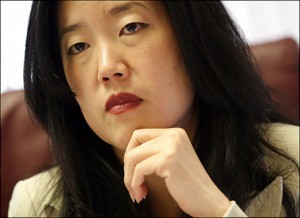Who thinks afresh in education?
In India? In the USA?
Each country and culture has its own challenges and opportunities?

Readers this time would find on the other page, an edited version of an interview with Mechelle Rhee, a South Korean American lady of high intelligence and grit, who is an education director of schools, in Washington DC and now she is in charge of another state.
Her views on American school education must give the Indian readers some idea of what is happening in secondary education in the most developed country and also what is happening in other countries.
In Europe itself there are concerns and interest in the quality of secondary education. A latest comparison of school children in the USA and in Western European countries from the Nordic states like Norway, Finland to other countries show that in the key subjects like maths, science and computing the US school children are far behind, lagging behind those children in the Nordic countries.
Ms.Rhee herself says in the interview that the South Korean children work hard compared with any other country children.
It is a well-known fact and assessment that compared to other country children those from Japan, South Korea and Singapore, may be Malaysia, the children in these countries work harder and also show high grades in key subjects like science, maths and computing.
Fine! Where does India come in these comparisons or debates?
There is no answer here. There is no one; it seems, here to take up such questions and debate issues of comparison. Or, are we so sure of our own grades and our own educational philosophy?
At least, there is Barack Obama, a father of two school-going kinds, girls whose education he keenly follows and often talks about in public!
This is so refreshing and also gives the world, the world of parents and members of society some creative inspiration to look ahead and think about education and the related matters like culture and society and what have we?
After all, education must give us this sentiment, a sentiment to feel engaged with the world we live in and also a world in which the centre of attention is children and the way they grow up in the world we are all shaping together.
Education is a field that always engages the attention of so many sensitive individuals. See the very history of education!
Oh, how many names, names that had inspired down the ages. Individuals and philosophies, from the towering figures like Socrates to Plato to Rousseau to many others. The very many education experimenters.
In education, at any rate, it is the creative side of man, the very idea of education itself is a creative process, and we see so many different individuals and education experimenters.
The very Kindergarten to university we have so many daring and bold experimenters.
Now, we live, unlike in any previous era, with more educated parents, educated public. There is the globalisation process further.
There is a great migration process taking place. Every country has its quota of migrant population. More so the USA where we have a big Indian presence, something like 21 million Indian origin persons. May be next to the Chinese, we Indians fill the American space, and then come the Spanish and the Mexicans.
As for the other European countries we have UK, France and Germany with large migrant workers population.
All these large scale migration of population had also impacted the way we think of education as a tool for acquiring various skills and capabilities. So, what sort of education, the school education in particular here, we envisage?
Should we have more exam-focused success in key subjects?
Should there be a mix of different streams, say, humanities and sciences, emphasis on physical exercise, sports and culture, say music and dances?
Surely, the CBSE syllabus is also changing towards more an open-book exam system.
But then, these issues depend upon whom you are focused, who you are also!
There days politicians have spoilt the education standards, critics say.
There is the very steep deceleration in education standards, right?
Our universities don’t find any mention in the rankings of the top 100, if not the top 200 universities. While we find Japan, China and Hong Kong universities finding a place in the list. What do we do with such rankings?
Should we talk about this die of our story or should we keep quiet?
Then comes other areas like the mushrooming of professional colleges, in engineering and now medicine. Then comes the second schooling.
There is a clear need to diversify the secondary school curriculum so that we can give enough room for new experimentation. The rich and the poor mingle in this stream. There is also the class bias.
The UK school model is always based on this recognition of a class barrier in education. Not so much in the French lycee system but here too we find such social gradation. Education, ultimately, must reflect the reality of the outside world.
Education also must serve many other goals.
These days, we in India, are at the stage of new developments. As our economic development catches up with other developed countries our aspirations might give rise to new aspirations in acquiring a class-based education.
Already this is happening. We see new and more International Schools, Baccaulaureate and what else.There is this new trend.
The new rich now send their children abroad for education.
And we have the America based, well-off middle class Indians competing for places at Harvard and other Ivy League schools.
Whatever are the current deficits and future aspirations, education in one field where there is always room for fresh thinkng? Last generation we had had great leaders who also thought of education. Tagore and Gandhi.
This generation we have to identify the new thinkers and visionaries.